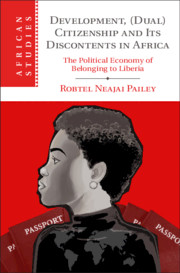 Development, (Dual) Citizenship and Its Discontents in Africa
Development, (Dual) Citizenship and Its Discontents in Africa Book contents
- Development, (Dual) Citizenship and Its Discontents in Africa
- African Studies Series
- Development, (Dual) Citizenship and Its Discontents in Africa
- Copyright page
- Contents
- Figures and Tables
- Acronyms
- Acknowledgements
- Introduction
- 1 Methodological, Theoretical, and Biographical Reflections
- 2 The Political Economy of Belonging to Liberia
- 3 Dual Citizenship and Its Discontents in Africa
- 4 Give Me Your Land or I’ll Shoot!
- 5 Between Rootedness and Rootlessness
- 6 The Dichotomy of Diasporic Developmentalism
- Conclusion
- Book part
- References
- Index
- African Studies Series
4 - Give Me Your Land or I’ll Shoot!
Published online by Cambridge University Press: 07 January 2021
- Development, (Dual) Citizenship and Its Discontents in Africa
- African Studies Series
- Development, (Dual) Citizenship and Its Discontents in Africa
- Copyright page
- Contents
- Figures and Tables
- Acronyms
- Acknowledgements
- Introduction
- 1 Methodological, Theoretical, and Biographical Reflections
- 2 The Political Economy of Belonging to Liberia
- 3 Dual Citizenship and Its Discontents in Africa
- 4 Give Me Your Land or I’ll Shoot!
- 5 Between Rootedness and Rootlessness
- 6 The Dichotomy of Diasporic Developmentalism
- Conclusion
- Book part
- References
- Index
- African Studies Series
Summary
Chapter 4 chronicles how conflict—manifested in physical and structural violence—simultaneously ruptured and sealed government-citizen and citizen-citizen relations thereby casting citizenship as a site of enduring struggle for Liberia. It employs Long’s notion of the interface as well as Galtung’s conflict triangle to designate conflict as a dynamic process in which the ‘incompatibility of goals’ of different actors (contradiction) fuels their perceptions and misperceptions of themselves and each other (attitudes) thereby influencing actions (behaviour) that may range from opposition to accommodation.Specifically, the chapter maintains that Liberian citizenship has been constructed and reconstructed because of conflicts precipitated by four major interfaces between a range of actors beginning with the indigenous wars of resistance during Liberia’s state formation in the nineteenth century and climaxing in twenty-first century post-war rivalries over income, land tenure, and transitional justice. While strained government-citizen relations engendered dissent and divergence, improvements in those relations also ushered in intervals of consent and convergence. This chapter demonstrates that a decade-long impasse on dual citizenship reveals how Liberian citizenship has changed across space and time through conflict and crisis and is still undergoing transformation.
Keywords
- Type
- Chapter
- Information
- Development, (Dual) Citizenship and Its Discontents in AfricaThe Political Economy of Belonging to Liberia, pp. 110 - 141Publisher: Cambridge University PressPrint publication year: 2021


